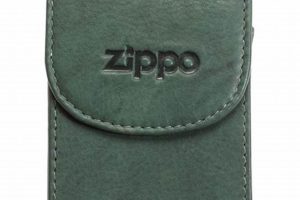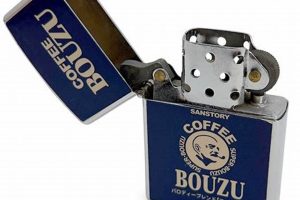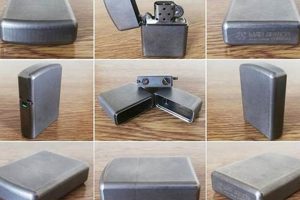Cases designed to hold Zippo lighters and adhering to Department of Transportation (DOT) regulations permit safe transport of these lighters, primarily on aircraft. These regulations address concerns about accidental ignition and fuel leakage during transit. A compliant case typically features a robust, sealed construction designed to contain the lighter and any potential fuel vapors.
Transporting lighters safely benefits both individual travelers and the broader public. By containing potential hazards, these specialized cases contribute to safer air travel. Historically, regulations surrounding the transportation of flammable materials like lighter fluid have evolved, reflecting increased awareness of safety risks and advancements in containment technology. The demand for such cases arose directly from these regulatory changes, providing a practical solution for lighter owners.
The following sections will further explore the specific DOT regulations concerning lighter transport, delve into the design features of compliant cases, and offer recommendations for selecting and using a suitable case for safe and convenient travel with a Zippo lighter.
Tips for Safe Lighter Transport
Ensuring safe and compliant lighter transport requires careful consideration of regulations and appropriate case selection. The following tips offer guidance for travelers carrying Zippo lighters.
Tip 1: Verify Case Compliance: Before purchasing, confirm the case explicitly states its adherence to DOT regulations for lighter transport. Look for clear markings or labeling.
Tip 2: Empty the Lighter: While some compliant cases may permit transport of a filled lighter, emptying the lighter before travel is generally recommended as an added safety precaution.
Tip 3: Secure the Lighter within the Case: Ensure the lighter fits snugly within the case to prevent movement and potential damage during transit.
Tip 4: Check Airline Regulations: While DOT regulations provide a baseline standard, individual airlines may have additional restrictions. Consulting the specific airline’s policies before travel is advised.
Tip 5: Pack the Case Appropriately: Place the case in carry-on or checked baggage according to airline guidelines. Never pack a lighter outside of a DOT-compliant case within checked luggage.
Tip 6: Inspect the Case Regularly: Periodically examine the case for signs of wear and tear. Replace any damaged cases immediately to ensure continued compliance and safety.
Tip 7: Understand International Regulations: If traveling internationally, research and adhere to the specific regulations of the destination country regarding lighter transport.
Adhering to these guidelines helps ensure safe and hassle-free travel with a Zippo lighter. Proper case selection and mindful packing procedures contribute significantly to overall travel safety.
By following these recommendations, travelers can confidently and responsibly transport their lighters while complying with all applicable safety regulations. This responsible approach benefits both the individual traveler and the broader traveling public.
1. Safety
Safety stands as a paramount concern regarding the transportation of potentially hazardous items like Zippo lighters. Regulations governing the transport of such items exist to mitigate risks and ensure public safety. DOT approved cases play a critical role in achieving this objective.
- Fire Prevention
A primary safety concern associated with lighter transport is the prevention of accidental ignition. DOT approved cases address this risk through robust construction and secure closure mechanisms, minimizing the possibility of the lighter igniting during transit due to impact or friction. A well-designed case acts as a barrier against accidental sparks or flames.
- Fuel Containment
Leakage of lighter fluid presents another significant hazard. Approved cases feature seals and robust construction designed to contain lighter fluid, preventing it from spilling and potentially igniting or causing other safety issues. This containment safeguards against both fire hazards and the release of potentially harmful vapors.
- Impact Resistance
The rigors of travel, particularly air travel, subject luggage to various impacts and pressures. DOT approved cases offer a degree of impact resistance, protecting the lighter from damage and further reducing the risk of accidental ignition or fuel leakage caused by physical stress. This durability safeguards the lighter’s integrity throughout the journey.
- Regulatory Compliance
Using a DOT approved case demonstrates adherence to established safety standards, contributing to a safer travel environment for all. Compliance with these regulations is not merely a procedural matter; it represents a commitment to responsible handling of potentially hazardous materials and reflects a broader awareness of safety considerations.
The various safety facets of DOT approved casesfire prevention, fuel containment, impact resistance, and regulatory complianceconverge to create a comprehensive safety solution for transporting Zippo lighters. These features ensure the safe handling and transport of these items, minimizing potential risks and contributing to overall travel safety. Selecting and using an approved case represents a proactive step towards responsible lighter ownership and reflects a commitment to public safety.
2. Compliance
Compliance with regulations regarding the transportation of hazardous materials, such as Zippo lighters containing flammable fluid, forms a cornerstone of safe and legal travel. Utilizing a DOT approved case demonstrates adherence to these regulations, mitigating potential risks and facilitating smooth transit. Understanding the various facets of compliance provides a comprehensive perspective on its importance.
- Adherence to DOT Regulations
DOT regulations specify requirements for transporting hazardous materials, including lighters. These regulations dictate permissible lighter types, allowable fuel levels, and necessary containment measures. A DOT approved case signifies that the case’s design and construction meet these stringent standards, ensuring safe transport by air. Ignoring these regulations can lead to confiscation of the lighter, fines, or even legal repercussions.
- Air Travel Safety
Compliance with DOT regulations directly contributes to air travel safety. By containing potential fire hazards and preventing fuel leakage, approved cases minimize risks associated with lighter transport in the pressurized environment of an aircraft. This adherence to safety protocols protects not only the individual carrying the lighter but also fellow passengers and the aircraft itself.
- International Travel Considerations
While DOT regulations primarily govern domestic travel within the United States, international travel often involves navigating different sets of regulations. Researching and complying with the specific regulations of the destination country is crucial. Using a DOT approved case provides a strong foundation for compliance but does not guarantee adherence to all international standards. Additional precautions may be necessary depending on the specific destination.
- Responsibility and Legal Obligations
Transporting hazardous materials carries inherent responsibilities. Using a DOT approved case demonstrates a commitment to fulfilling these responsibilities and adhering to legal obligations regarding safe transport. This proactive approach underscores a respect for safety regulations and contributes to a secure travel environment.
Compliance, therefore, extends beyond simply using an approved case. It encompasses a thorough understanding of regulations, a commitment to safe practices, and a proactive approach to mitigating potential risks. Choosing a DOT approved case represents a crucial step in fulfilling these compliance requirements, contributing to a safer and more secure travel experience for all.
3. Containment
Containment represents a critical function of DOT approved cases for Zippo lighters, directly addressing the potential hazards associated with transporting flammable materials. Effective containment safeguards against accidental ignition and fuel leakage, ensuring the safety of the individual traveler, fellow passengers, and the aircraft. Understanding the key aspects of containment highlights the importance of using an approved case.
- Structural Integrity
The structural integrity of the case forms the foundation of effective containment. A robust construction, typically utilizing durable materials like metal or impact-resistant plastic, prevents the lighter from being crushed or damaged during transit. This safeguards against accidental ignition caused by impact or pressure. For example, a metal case with reinforced corners can withstand greater force than a thin plastic case, providing superior protection and containment.
- Seal Mechanisms
Secure seal mechanisms play a crucial role in preventing fuel leakage. A tight-fitting lid or closure, often incorporating O-rings or gaskets, creates a reliable seal that contains lighter fluid vapors, preventing them from escaping into the surrounding environment. A well-sealed case minimizes the risk of flammable vapors accumulating and potentially igniting. A spring-loaded closure mechanism, for instance, offers a more secure seal compared to a simple friction-fit lid.
- Material Compatibility
The materials used in the case’s construction must be compatible with lighter fluid to prevent degradation or chemical reactions that could compromise the case’s integrity. Using materials resistant to the corrosive effects of lighter fluid ensures long-term effectiveness and reliable containment. For example, certain types of plastic may become brittle or weakened upon prolonged exposure to lighter fluid, while metal alloys offer greater resistance.
- Size and Fit
The case should be appropriately sized to snugly hold the Zippo lighter, preventing movement and potential damage during transit. A secure fit minimizes the risk of the lighter striking the inside of the case, potentially causing sparks or damage. A case specifically designed for Zippo lighters ensures a proper fit and optimal containment.
These elements of containmentstructural integrity, seal mechanisms, material compatibility, and size and fitcombine to create a secure environment for transporting a Zippo lighter. A DOT approved case that effectively addresses these aspects significantly reduces the risks associated with transporting flammable materials, ensuring safer travel for all. Choosing a case that prioritizes these containment features demonstrates a commitment to responsible lighter ownership and reinforces adherence to safety regulations.
4. Regulations
Regulations governing the transportation of hazardous materials, including items like Zippo lighters containing flammable fluid, are essential for public safety. These regulations, primarily established by the Department of Transportation (DOT), dictate specific requirements for transporting such items, particularly during air travel. Understanding these regulations and their connection to DOT approved cases is crucial for safe and compliant lighter transport.
- DOT Hazardous Materials Regulations (HMR)
The DOT HMR provides the framework for transporting hazardous materials in the United States. 49 CFR 173.308 specifically addresses flammable liquids in passengers’ and crewmembers’ baggage. These regulations stipulate the types of lighters permitted, allowable fuel quantities, and the necessity of approved containers for transport. Adhering to these regulations is a legal requirement and forms the basis for safe lighter transport.
- International Air Transport Association (IATA) Dangerous Goods Regulations (DGR)
For international travel, the IATA DGR provides globally harmonized rules for transporting dangerous goods by air. These regulations often align with DOT HMR but may contain specific variations depending on the country. Consulting both DOT and IATA regulations ensures comprehensive compliance for international flights. Understanding these international standards is particularly important for travelers crossing international borders.
- Airline-Specific Regulations
While DOT and IATA regulations provide overarching guidelines, individual airlines may implement additional restrictions. These airline-specific policies often reflect heightened safety concerns or specific operational requirements. Consulting the airline’s website or contacting customer service before travel ensures awareness of any specific restrictions related to lighter transport. This proactive approach avoids potential complications during check-in or boarding.
- Enforcement and Penalties
Enforcement of these regulations occurs at various levels, including airport security checkpoints and customs inspections. Non-compliance can result in confiscation of the lighter, fines, or even legal penalties. Understanding the potential consequences of non-compliance underscores the importance of adhering to regulations and using a DOT approved case. This awareness promotes responsible behavior and reinforces the significance of safety protocols.
Regulations surrounding lighter transport are multifaceted, encompassing DOT HMR, IATA DGR, airline-specific policies, and enforcement procedures. Using a DOT approved case demonstrates a commitment to complying with these regulations and prioritizes safety. This proactive approach contributes to a secure travel environment and ensures a smoother, hassle-free travel experience. Understanding and adhering to these regulations is not merely a matter of compliance but a fundamental aspect of responsible lighter ownership and air travel safety.
5. Air Travel
Air travel presents unique challenges regarding the transportation of potentially hazardous materials, including items like Zippo lighters containing flammable fluid. The pressurized cabin environment and stringent safety protocols necessitate careful consideration of how such items are transported. DOT approved cases play a crucial role in mitigating risks associated with lighter transport during air travel.
- Cabin Pressure and Flammability
Changes in cabin pressure during flight can affect the behavior of flammable liquids. Lower pressure at higher altitudes can increase the volatility of lighter fluid, potentially leading to leakage or easier ignition. A DOT approved case with a secure seal helps mitigate this risk by containing the lighter fluid and its vapors, preventing release even under changing pressure conditions. This containment is crucial for maintaining cabin safety.
- Security Regulations and Screening Procedures
Airport security checkpoints enforce strict regulations regarding the transport of hazardous materials. Lighters transported without an approved case are likely to be confiscated. Using a DOT approved case streamlines the security process, demonstrating compliance with regulations and facilitating smoother passage through checkpoints. This preparedness avoids delays and potential complications during the security screening process.
- Baggage Handling and Potential Impacts
Checked baggage undergoes significant handling and potential impacts during transit. A DOT approved case provides a protective barrier for the lighter, safeguarding it against damage and reducing the risk of accidental ignition or fuel leakage caused by rough handling. This protection ensures the lighter’s safe arrival at the destination.
- Emergency Preparedness and Fire Safety
In the unlikely event of an in-flight emergency, a DOT approved case containing a lighter provides an additional layer of safety by preventing the lighter from becoming a source of ignition. This containment contributes to overall fire safety protocols within the aircraft cabin. While rare, such precautions are essential for mitigating potential risks in emergency situations.
The intersection of air travel and DOT approved cases for Zippo lighters highlights the critical importance of adhering to safety regulations. Using an approved case is not merely a procedural requirement but a crucial step in mitigating potential hazards associated with transporting flammable materials in a pressurized aircraft environment. This responsible approach benefits individual travelers, fellow passengers, and overall air travel safety. By understanding and adhering to these safety protocols, travelers contribute to a more secure and efficient air travel experience for everyone.
6. Material Durability
Material durability plays a critical role in the effectiveness of a DOT approved case for Zippo lighters. The case’s ability to withstand the rigors of travel, including impacts, pressure changes, and potential exposure to chemicals, directly impacts its ability to safely contain the lighter and its flammable fuel. A durable case provides consistent protection, reducing the risk of accidental ignition or fuel leakage throughout the lighter’s transport. Inferior materials may degrade over time, compromising the case’s structural integrity and sealing capabilities, thus negating its protective function.
Consider, for instance, a case constructed from thin, brittle plastic. Such a case may crack or shatter under relatively minor impact, exposing the lighter and potentially releasing fuel. Conversely, a case made from robust, impact-resistant materials, such as metal alloys or high-density polymers, offers superior protection against damage, ensuring the lighter remains securely contained even under stress. The choice of material directly influences the case’s longevity and its capacity to provide consistent, reliable protection throughout its lifespan. A durable case represents a long-term investment in safety, reducing the need for frequent replacements and ensuring ongoing compliance with regulations.
The practical significance of material durability in a DOT approved case cannot be overstated. A durable case provides peace of mind for travelers, knowing their lighter is safely and securely contained, minimizing potential risks. This durability also contributes to the overall effectiveness of safety regulations by ensuring the long-term reliability of containment measures. Selecting a case constructed from high-quality, durable materials ultimately reinforces the commitment to safe and responsible lighter transport.
7. Lighter Protection
Lighter protection represents a primary function of DOT approved cases for Zippo lighters, extending beyond mere compliance with regulations. These cases safeguard the lighter from various potential hazards during transport, ensuring its functionality and preventing accidental ignition or fuel leakage. Effective lighter protection contributes significantly to overall travel safety and responsible lighter ownership.
- Impact Resistance
A robust case shields the lighter from impacts and shocks inherent in travel, particularly within checked baggage. A sturdy metal case, for example, provides significantly greater protection against crushing forces compared to a flimsy plastic container. This protection preserves the lighter’s functionality and prevents damage that could lead to fuel leaks or accidental ignition.
- Scratch and Abrasion Resistance
The exterior of a protective case safeguards the lighter’s finish from scratches and abrasions caused by contact with other items in luggage. A case with a durable exterior finish, such as a powder-coated or anodized metal, minimizes cosmetic damage, preserving the lighter’s appearance and value. This protection maintains the lighter’s aesthetic appeal despite the rigors of travel.
- Environmental Protection
A well-sealed case protects the lighter from environmental factors such as moisture, dust, and extreme temperatures. This protection is particularly important for lighters transported in checked baggage, where exposure to varying environmental conditions is more likely. A sealed case prevents corrosion, maintains functionality, and extends the lighter’s lifespan.
- Prevention of Accidental Activation
A securely closed case prevents accidental activation of the lighter’s ignition mechanism during transit. This feature is crucial for preventing unintended fires and preserving fuel. A case with a positive locking mechanism, for example, ensures the lighter remains securely closed even under pressure or impact, eliminating the risk of accidental ignition.
These facets of lighter protectionimpact resistance, scratch and abrasion resistance, environmental protection, and prevention of accidental activationdemonstrate the comprehensive safety benefits provided by a DOT approved case. By safeguarding the lighter from various potential hazards, these cases contribute significantly to responsible lighter ownership and enhance overall travel safety. Selecting a case that prioritizes these protective features ensures the lighter’s preservation and minimizes potential risks throughout its transport.
Frequently Asked Questions
This section addresses common inquiries regarding DOT approved cases for Zippo lighters, providing clarity on regulatory compliance and safe transport practices.
Question 1: Are all Zippo lighter cases DOT approved?
No, not all Zippo lighter cases are DOT approved. Only cases specifically designed and marked as compliant with DOT regulations for the transport of hazardous materials meet the necessary safety standards for air travel. One should look for clear labeling indicating DOT approval before purchasing.
Question 2: Can a filled Zippo lighter be transported in a DOT approved case?
While some DOT approved cases may allow for the transport of a filled lighter, it is generally recommended to empty the lighter before travel as an added safety precaution. This practice minimizes the risk of fuel leakage during transit.
Question 3: Where can one purchase a DOT approved case for a Zippo lighter?
DOT approved cases are typically available for purchase at tobacco shops, online retailers specializing in lighters and accessories, and some travel stores. Verifying DOT compliance before purchase is crucial.
Question 4: What are the penalties for transporting a Zippo lighter improperly?
Penalties for non-compliance with DOT regulations regarding lighter transport can vary. Consequences may include confiscation of the lighter, fines, and potential legal repercussions. Adhering to regulations ensures a smooth and hassle-free travel experience.
Question 5: Do international regulations differ from DOT regulations regarding lighter transport?
Yes, international regulations can differ significantly from DOT regulations. Researching and adhering to the specific regulations of the destination country is essential for international travel. While a DOT approved case may provide a good starting point, it does not guarantee compliance with all international standards.
Question 6: How can one verify the authenticity of a DOT approved case?
Look for clear markings on the case indicating its DOT approval. These markings often include specific regulatory codes or certifications. Purchasing from reputable retailers specializing in lighter accessories also helps ensure authenticity.
Ensuring safe and compliant lighter transport requires careful consideration of regulations and the selection of an appropriate DOT approved case. Adherence to these guidelines benefits individual travelers and contributes to overall travel safety.
For further information and detailed guidance, consult the official DOT regulations and the specific policies of the intended airline.
DOT Approved Cases for Zippo Lighters
Transporting Zippo lighters safely and compliantly requires adherence to established regulations, particularly during air travel. DOT approved cases provide the necessary safeguards for containing flammable lighter fluid and preventing accidental ignition. This article explored the critical aspects of these specialized cases, emphasizing their role in maintaining safety and regulatory compliance. Key considerations included the importance of robust construction, secure sealing mechanisms, material durability, and adherence to both domestic and international regulations. The significance of proper case selection and responsible lighter handling practices was underscored throughout.
Safe lighter transport is a shared responsibility, impacting individual travelers and the broader public. Investing in a DOT approved case demonstrates a commitment to safety and regulatory compliance. Continued awareness of evolving regulations and responsible handling practices will further enhance the safety and efficiency of air travel for all.







